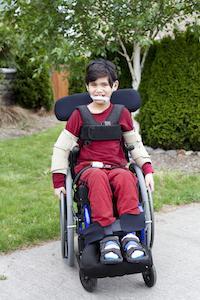Wheaton Office |
St. Charles Office |
Sycamore Office
 630-665-7300
630-665-7300
Caring for Your Disabled Child with Supplemental Needs Trusts

Trusts are created for a wide number of reasons; for example, they can be utilized to provide for loved ones, hold property, and pass down wealth to future generations. Supplemental needs trusts are one way that family members can help provide for disabled members of their family, while also allowing those individuals to retain their State and public assistance. This can be particularly helpful for divorcing parents with special needs children.
In Illinois, there are two types of supplemental needs trusts that can be created: third party supplemental needs trusts and supplemental needs payback trusts. Both of these trusts give the child beneficiary the means to enhance his or her quality of life by providing goods or services that are not offered by government assistance programs. A third party supplemental needs trust, also known as a 15.1 trust in Illinois, allows an individual to provide for a disabled child without interrupting or otherwise interfering with the child's Medicaid expenditures. Usually, third party supplemental needs trusts are set up by the special needs child's parents.
Third Party Supplemental Needs Trust
Illinois Compiled Statutes 760 ILCS 5 #15.1 states that a supplemental needs trust is a “discretionary trust [created] for the benefit of an individual” having a disability that “substantially impairs the individual's ability” to care for his or herself. The individual shall not be “liable to pay or reimburse any State or public agency for financial aid or services” provided for the individual. However, the statute requires that the trust is solely discretionary (the trustee decides how the income is spent) and the disabled individual cannot have control over the property/income itself.
There are a few requirements necessary to execute a valid 15.1 trust:
- A person must have a disability that substantially impairs that individual's ability to care or provide custody for him or herself;
- The disabled individual cannot be a trustee of the supplemental needs trust. One of the keystones in creating a 15.1 trust is the requirement that a trustee has discretionary power over the trust property, meaning that the trustee has the ability, or discretion, to choose how the trust property is spent on the disabled beneficiary;
- The property held by the trust cannot be the disabled person's own property, as such property is better fit for a supplemental needs payback trust. Putting property belonging to the disabled person into a 15.1 trust will subject the trust to different rules, and the trust property will be used to reimburse Medicaid and state expenditures that are outstanding upon the death of the disabled individual. The property held in a 15.1 trust must be provided through a separate means, such as a gift, inheritance, or settlement.
A 15.1 trust can be funded at the time that it is created, or at a later date, such as with a testamentary transfer to the trust upon the death of the surviving parent.
Supplemental Needs Payback Trust
A 15.1 trust differs slightly from a supplemental needs payback trust, also known as an OBRA 93 trust. In a supplemental needs payback trust a disabled beneficiary is still entitled to Medicaid benefits, but any or all of the disabled beneficiary's property can fund the trust without changing the benefit status for the disabled individual.
The requirements to execute a valid OBRA 93 trust are similar to that of the third party special needs trust. The major differences between a third party special needs trust and a supplemental needs payback trust occur at the death of the beneficiary: upon death, any property remaining in the special needs payback trust must be used to first reimburse Medicaid and State expenditures before being disposed to the beneficiaries designated by the creator of the trust. A disabled beneficiary to a third party special needs trust, however, is not required to reimburse any State or Medicaid expenditures, and any property remaining in trust at the death of the disabled beneficiary will pass to the surviving beneficiaries as designated by the terms of the trust.
Even if a child has no assets at the time that the third party special needs trust is created, it does not mean that the child will never have assets of his own. Therefore, it is prudent to draft both a third party special needs trust as well as a special needs payback trust to avoid complications in your child's future.
Regardless of the type of needs a disabled child may have, navigating through the intricate process of special needs trusts is extremely complicated. The knowledgeable attorneys at Mirabella, Kincaid, Frederick, & Mirabella can help you draft the appropriate documents allowing you to provide for your special needs child or family member both during and after your divorce, while ensuring your child will be able to retain his or her State and public benefits. Contact us today for an Initial Attorney Meeting.


 Read More
Read More





